Comet Neowise might just be the biggest space snowball in decades. After two other promising comets discovered earlier this year — Swan and Atlas — fizzled and faded away, Comet C/2020 F3 (aka Neowise) appears poised to deliver a spectacular show.
On Saturday, NASA published a picture by the Czech photographer Miloslav Druckmüller as an astronomy picture of the day.
NASA’s Astronomical Picture of the Day (APOD) is a prestigious award for the most interesting photographs of the universe, selected and supplemented of caption by astronomers Jerry Bonnell and Robert Nemiroff.
The Comet Neowise was seen above Prague Castle on 13 July 2020.
According to NASA solar system ambassador Eddie Irizarry, it should remain visible just before and around the time of first light until July 11. The comet will then dip below the horizon as it transitions from being an early riser to a cocktail hour sensation, hopefully.
It’ll start to be visible again in the evening around July 15-16. It should be a little easier to see during the second half of July when it’s a little higher in the sky.
The comet’s closest pass by Earth will be July 23, which might make for a particularly exciting viewing opportunity if the comet’s brightness continues to hold where it is or even intensifies. It’ll also rise a little higher in the sky on July 24 and 25 in case you miss the actual flyby date.
Comets are notoriously fickle things that could always break up and burn out at any moment, so fingers crossed.


- If you are looking for a job in Prague, check our new job section here
- Time to move to a new flat? Rents with no commission here!
- Want to advertise your business on Prague Morning? Contact us at info@praguemorning.cz
Every Thursday evening and until the end of September, you can enjoy a unique view of Prague on the roof of the National Agricultural Museum in Letná.
The National Agriculture Museum has been recently reconstructed and restored to its 1930s look, a process that also made the roof terrace accessible.
The terrace offers unique and attractive views at Prague, including the Prague Castle, Petřín or Old Town. The garden with soft grass, a herb garden, a picnic area is great for relaxation. What is also interesting is that there are also beehives.
Aside from the smell of the herb garden, you can also rent some picnic equipment, buy some quality Czech food in the museum shop, and enjoy the amazing scenery.
Visiting the museum is an excursion into the field of agriculture, with which the people living the center of Prague really do not come across. The whole exhibition is conceived as a story that leads the visitor through the history of the hard work of farmers.
The National Museum of Agriculture was founded in 1918 but its oldest part, the museum at the Ohrada hunting lodge, started its activities in 1842. It is apparently not only the oldest specialized forestry-hunting museum in the Czech Republic but also in Europe.
The terrace is open every Thursday from 17:30 until 21:30. Adults pay CZK 50, people under 18 and seniors over 70 have free admission.
Looking for a job in Prague? Visit our new job section!


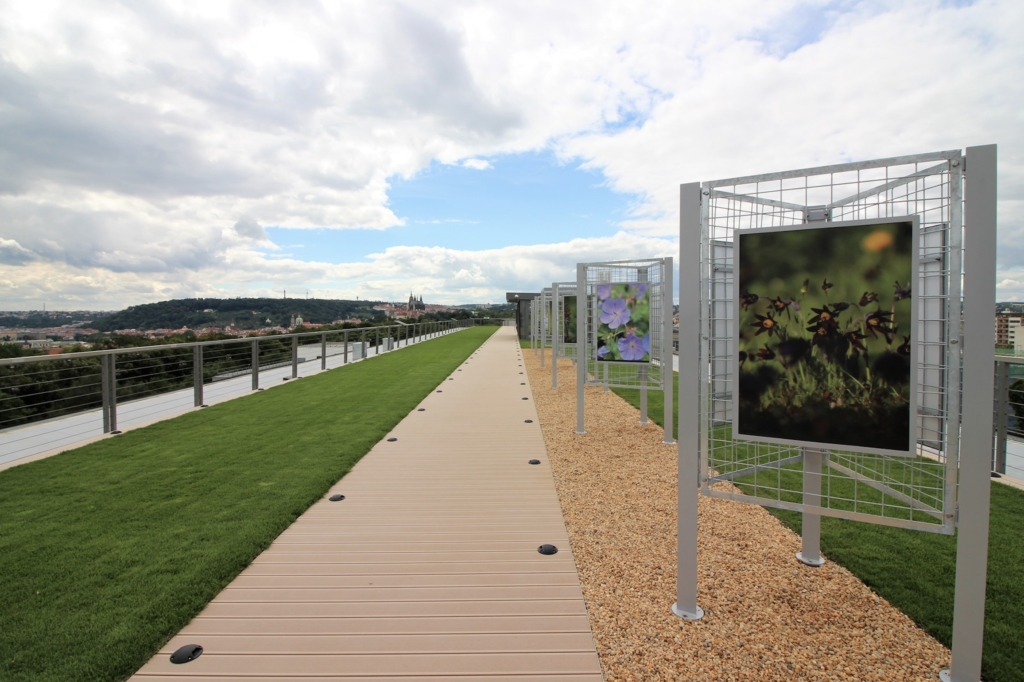
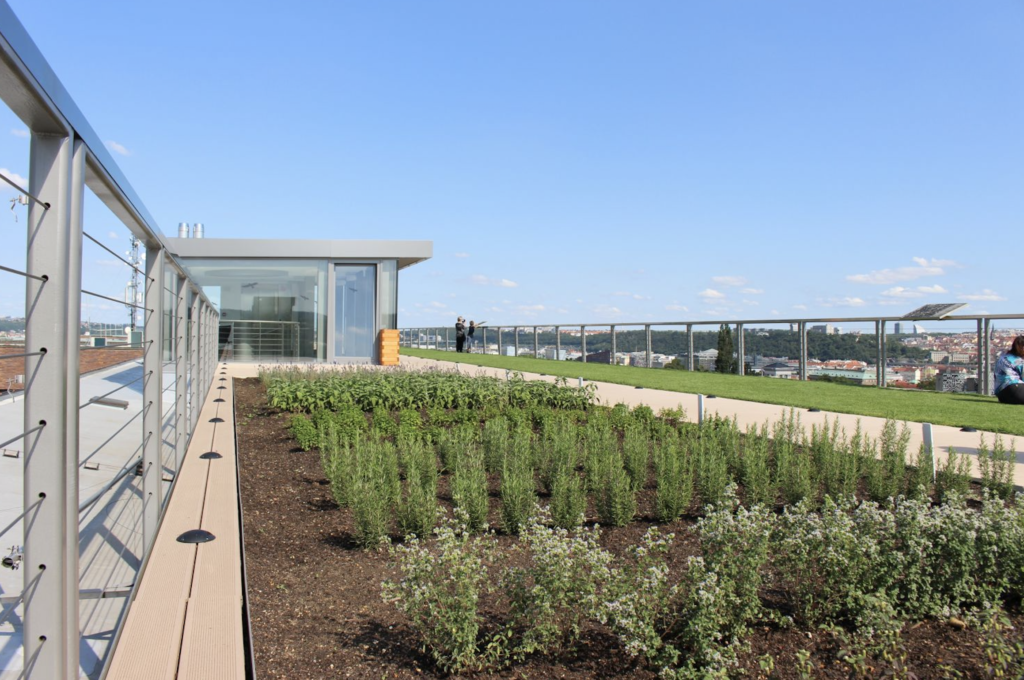
The Lucerna Palace (Palác Lucerna) is a huge building in central Prague, housing small shops, cafes, a music bar, a concert hall, and a cinema. There is also a paternoster lift that takes you to an amazing rooftop terrace.
The roof is open until the end of October 2020, Saturday to Monday 14.00 to 22.00 and entry is 100 Kč. If you arrive between 14.00 and 16.00 you can have a free drink from the rooftop bar.
The entrance is opposite the Great Hall in the Lucerna passage. A really friendly girl sold us our tickets and a grumpy security guard showed us to the paternoster lift – a chain of open compartments that move slowly in a loop up and down inside a building without stopping.
These things both scare and excite me, as I think I’m going to misjudge the jump into the compartment and be chopped in half – I’m also not good with revolving doors! Hence, I couldn’t start my video until after I was safely aboard.
You’re supposed to jump out at the top floor, but I stayed in the compartment and let it take me over the top and back down again – no you aren’t turned upside down!
At the top, another really friendly girl checked our tickets and we were inside. We wandered around the various rooftop terraces. The space is huge and there is work in progress to expand the terraces. The views are amazing.

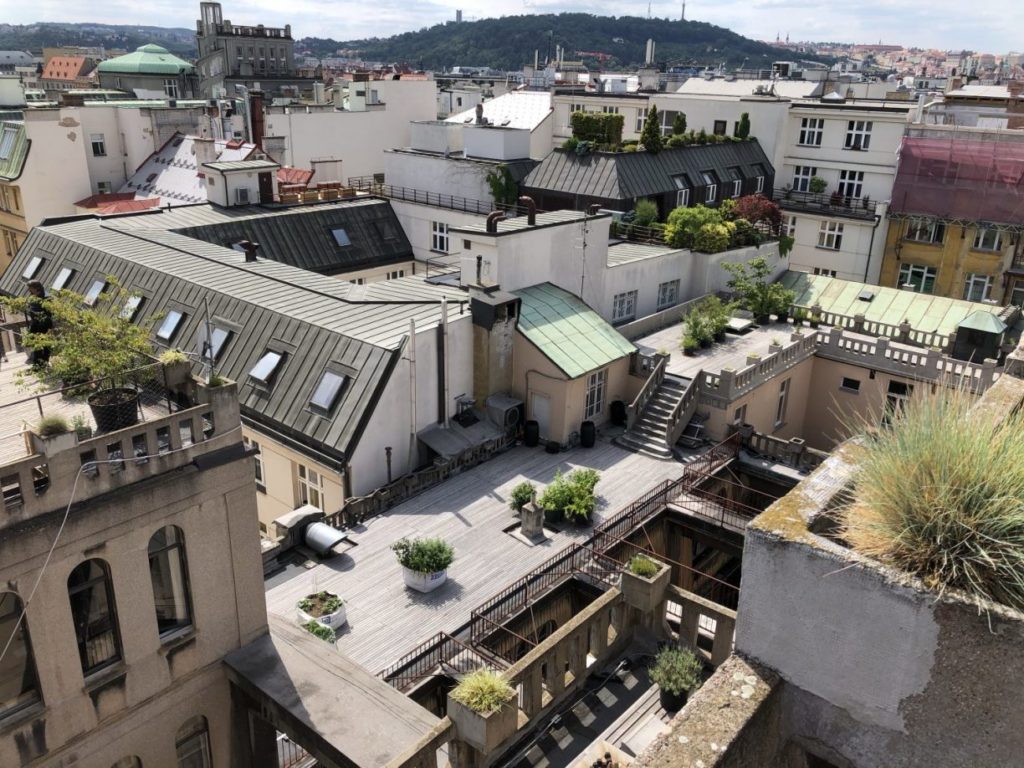
I’d previously written to Střecha Lucerny and asked some questions about the space – they didn’t reply. But I found one of the organizers and was able to ask him. My questions and his replies in between each of the following pictures.
Q. How do the rooftop concerts work – is there some program?
A. They are just short 15-minute concerts played at sunset. You can find out more from the Facebook page
Q. There are just a few tables – can I reserve one?
A. Yes, if you call ahead, we’ll do our best. There will be more tables when the reconstruction of the other terraces are complete.
Q. If I purchase a ticket and visit during the afternoon, can I return with that ticket in the evening?
A. No, you would need to purchase another ticket.
Q. Is food available?
A. Yes, some small bites, like tapas.
Q. What happens when it rains?
A. There is indoor space and we also have umbrellas that you can borrow.
Q. The website looks lovely, but doesn’t show any events or other information about visiting.
A. Yes, we know about that and we are working to resolve it.
We visited the bar. There were three staff working and they were really friendly.
Our first drink was free. The prices looked pretty good for the location; large beer 58 Kč, glass of wine 65 Kč, cappuccino 65 Kč. And we were given real glasses, not plastic cups.
There is an exhibition devoted to the history of the Havel family. The text is in Czech. My basic knowledge is that the palace was built between 1907-1920. The investor, organizer, and constructor was ing. Vácslav Havel, entrepreneur, whose grandson – Václav Havel – later became President.
Everyone working at Střecha Lucerny is friendly. It reminds me of when you visit a stately home run by amateur volunteers – all happy to chat, take your ticket or sell you a piece of homemade cake. It’s a nice atmosphere, but as a business, it’s ridiculously overstaffed and I have no idea how they can make any money – but maybe that isn’t their intention.
Střecha Lucerny
Palác Lucerna, Štěpánská 61, Praha

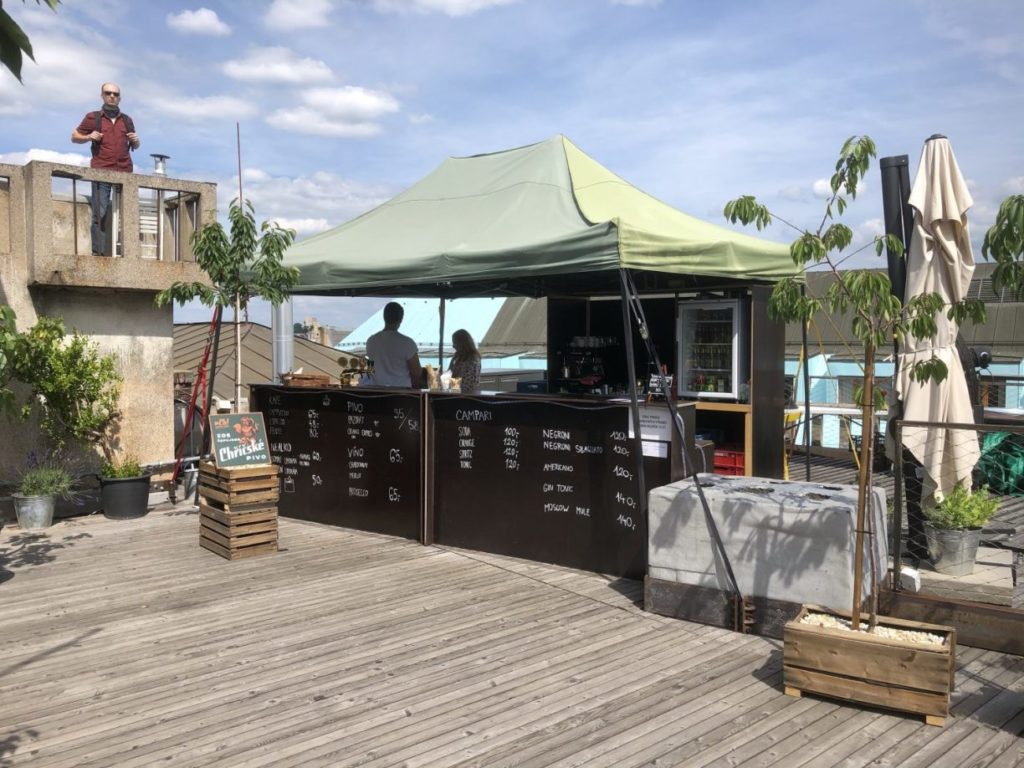
To prevent the spread of the COVID-19 pandemic, countries around the world have taken a variety of restrictive measures.
First 2020 numbers already show their significant impact on air transport for all 13 EU Member States according to an analysis conducted by the European Statistical Office (Eurostat): Czech Republic, Denmark, Germany, Croatia, Italy (see country note), Cyprus, Lithuania, Luxembourg, Hungary, Malta, Slovenia, Slovakia, and Finland.
Prague Airport is one of the most negatively affected airports in Europe: the number of passengers fell by more than 800,000, amounting to a drop of 65 percent year-on-year.
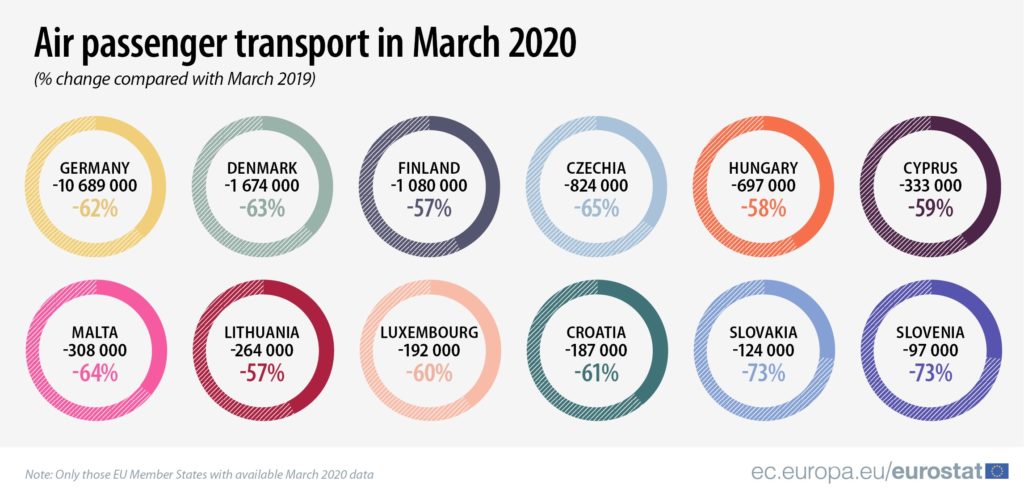
Prague Airport, together with Berlin’s Tegel and Schönefeld airports and Munich Airport, showed the largest percentage decrease when it comes to passengers handled. All four hubs had about 65 percent fewer travelers in March.
However, when considering absolute numbers, the number of passengers fell the most in Frankfurt by a total of 3.5 million.
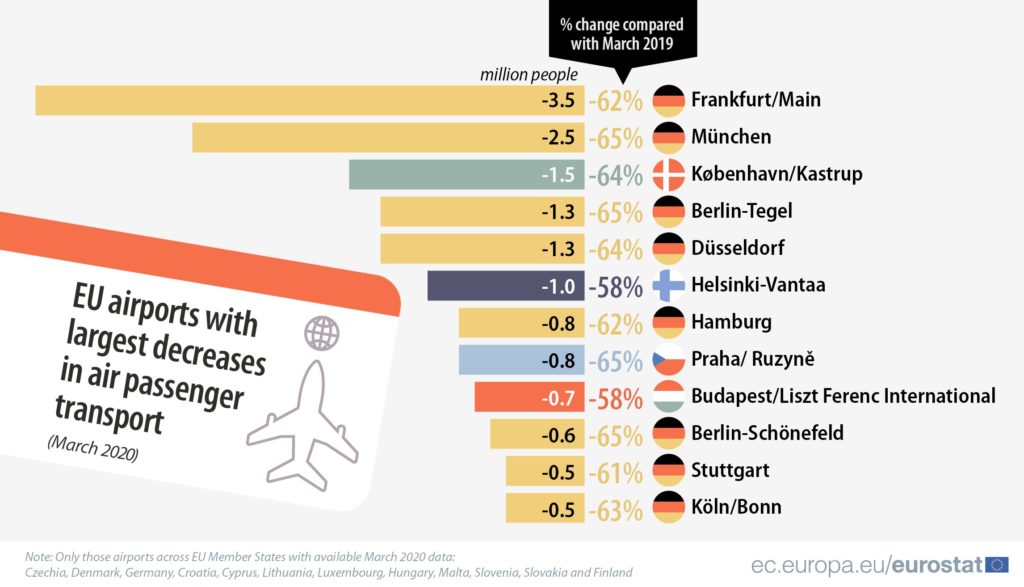
“None of the dozen EU airports shows a deeper percentage drop in the numbers of checked-in passengers than Prague’s airport,” said economist Lukáš Kovanda from the Czech Fund.
He also added that in January and February of this year, the number of passengers handled at Prague Airport was higher year-on-year, exceeding the value of one million in both months.
Whilst the number of air passengers in some of these EU Member States started to decrease already in February 2020, the number of passengers at least halved in all of them in March 2020.
Compared with March 2019, the largest decreases in numbers of passengers were observed in Italy (-85%, -11.9 million (see country note)), Germany (- 10.7 million passengers carried, -62%), Denmark (-1.7 million, -63%), Finland (-1.1 million, -57%), Czechia (-0.8 million, -65%) and Hungary (-0.7 million,
Poland is to open its borders with EU countries as of June 13, Prime Minister Mateusz Morawiecki announced in Łochów, north of Warsaw, on Wednesday.
The PM added that as of June 16, Poland will relaunch international flights, but noted that carriers “will probably need a week, or two or three, to prepare a flight-connection network.”
“In some countries…this pandemic is still behaving in a very disturbing way, so for now we limit this decision (opening borders) to European Union countries,” Morawiecki said.
Morawiecki, visiting one of Poland’s largest styrofoam factories, said Poland needs to restore normal trade relations with the European Union countries as quickly as possible.
Poland closed its borders to foreigners in March to stop the spread of the coronavirus. However, it has been progressively loosening restictions on public life, with shopping centres, hotels and restaurants all reopening in May.
Poland has seen a recent rise in infections, mostly centred around coal mines in the south. On Monday 599 new cases were reported, a record.
As of Wednesday morning Poland, a country of around 38 million people, had reported 27,668 cases of the coronavirus and 1,191 deaths.
The Metronome Festival Prague has released a statement letting fans and customers know that the music event has been postponed to June 17 – 19, 2021.
“In reaction to the regulations enacted by the government, we, unfortunately, must confirm that despite our best efforts Metronome Prague will be postponed to June 17–19, 2021. We’re very sorry to have to make this decision, but all possibilities for a date this year have been exhausted,” organizers wrote on the website.
“In light of the uncertainty of the situation in three months’ time, we’re facing a case where no one will purchase tickets and therefore we cannot organize the festival in the way we would like. We asked to meet with representatives of the Ministry of Health, but we continue to receive the answer that only 500 people can gather in one place even though we were prepared to accept all possible preventive measures that we proposed that would prevent the potential spread of contagions better than current measures.”
Unfortunately, flights from the US are also uncertain, which would prevent the participation of some performers. The good news is that talks with booking agents are positively progressing and more than half have confirmed the new date: June 17–19, 2021. All tickets purchased remain valid for the new date.
In case of serious reasons for refunding tickets, please contact us at tickest@metronomefestival.cz where we will address each situation individually.
About Metronome Festival
Metronome Festival Prague is the first large pop/rock festival to take place in the Czech capital. It strives to provide a cross-section of various genres and musical epochs, focusing on the hottest new sounds and the best of the past.
Slovenia has opened its borders to citizens of 14 states, including the Czech Republic, who can now travel to and from Slovenia without any coronavirus restrictions, the government said on its website on Monday.
The other countries are Greece, Bulgaria, Cyprus, Germany, Switzerland, Estonia, Latvia, Lithuania, Finland, Iceland, Norway, Slovakia and Liechtenstein.
The government also introduced an obligatory 14-day quarantine for everyone coming to Slovenia from North Macedonia, excluding diplomats, transport workers, and those passing through Slovenia without an overnight stay.
The move follows a surge in coronavirus cases in North Macedonia over recent days.
Slovenia, which in May became the first European state to declare an end to its coronavirus epidemic, has over the past few weeks opened its borders to citizens of neighbouring countries Croatia, Hungary, and Austria.
Slovenia has so far reported 1,485 coronavirus cases and 109 deaths. It introduced a general lockdown in the middle of March and has been gradually lifting it since April 20.
Czech scientists from the T. G. Masaryk Water Research Institute (VÚV TGM) have had promising results in detecting a coming coronavirus epidemic before it starts to spread in the population. The researchers found that, after several months of research, the only thing they need is a sample of wastewater.
Because bacteria and viruses do not get leave the body only through respiratory droplets but also through excrement, wastewater could become a valuable source of information.
“Indeed, it seems that this approach could be used as a basis for an early warning system for detecting the onset of another epidemic,” explains Hana Mlejnková of VÚV TGM, who is in charge of the wastewater project.
Czechia is one of the pioneers of wastewater research, one of only six countries in the world that have been able to carry out such demanding research.
“If it turns out to be a reliable tool, it will become one of the possible ways to detect a coming second wave,” says Jan Kynčl, head of the Department of Infectious Diseases Epidemiology at the State Institute of Public Health.
However, researchers had little reason to be optimistic in early April because, for a long time, they could not find the virus in the wastewater.
“At the beginning, it was surprising that we did not find any traces of coronavirus in the large wastewater treatment plants, as we knew there was a high number of infected individuals in the area,” says Mlejnková.
But the situation changed when the first results from small wastewater treatment plants in the municipalities arrived. Suddenly, scientists started to detect the coronavirus in these samples, even though the number of infected people in municipalities was, on average, much lower than in cities.
This was an important signal for researchers. It turned out that traces of the virus can be found in wastewater and that the method works, even if there are only a few coronavirus patients in the area. Researchers from the VÚV TGM explain that the small dilution and short piping probably made it easier to detect the virus. Thus, the small wastewater treatment plants could be a pillar of a coronavirus early warning system in the future.
“It will probably be necessary to identify critical places, in which the number of infected individuals could grow rapidly, but at the same time, the wastewater in the area will be concentrated,” comments Mlejnková on further steps of the research.
As wastewater treatment plant operators take samples regularly, the new method would not impose any additional burden on employees at the wastewater treatment plants.
“The early warning system could be implemented right away,” Mlejnková believes, pointing out that if the method proves successful, it could detect not only COVID-19 but also warn against other epidemics.
Earlier this week, Prague Mayor Zdeněk Hřib posted on his Facebook account that the city had created a new “Manual for a Cultivated Prague”, which delineates visual esthetic practices for the capital’s businesses.
Ms Třeštíková also said that the sudden crash in tourism could be used as an opportunity to reform some of the tourist locations in Prague, removing what has been called the “visual smog” in the capital, such as the many Thai massage parlors.
“The manual is the next step in the fight for a cleaner city center, following the slogan Prague is not Disneyland. The coronavirus crisis may also be an opportunity for change,” she adds.
The “Manual for Cultivated Prague” is a set of rules containing different decrees, regulations, and laws. According to Třeštíková, it is not a binding document. “We will explain through pictures what is advisable and what is not,” says Třeštíková.
The aim is, for example, to remove unnecessary stickers and to eliminate plastic boards with photographs of dishes typical of Chinese restaurants.
“At the moment, the streets of Prague are like a room where people speak very loudly and everyone are shouting. If we manage to talk a little more quietly, everyone will hear them,“ remarked the author of the manual, Kristýna Drápalová.
Moreover, the Prague Technical Communication Agency (TSK) will end its practice of renting placements for advertisers on billboards and posters in other public places.
The advertising is seen on bridges, billboards and other signage. Often the signage is in the middle of sidewalks or other places which are disadvantageous to pedestrians.
The city is also preparing a grant program to motivate entrepreneurs to follow the rules. They could get money, for example, to repair their facade, if they get rid of visual smog.
The Polish Minister of Foreign Affairs, Jacek Czaputowicz has travelled to Prague on his first foreign visit since the outbreak of the coronavirus pandemic.
During his talks with the Czech Minister of Foreign Affairs, Tomáš Petříček, Minister Czaputowicz expressed his expectation that the Czech authorities would reciprocate Poland’s decision to allow the transit of Czech citizens through Poland.
Currently, many Poles working in Austria are forced to take a detour through Germany instead.
The head of the Polish Ministry of Foreign Affairs assessed that the epidemic situation in all the countries of the region, especially in the Visegrad Group countries, is much better compared to most other EU states.
There had earlier been suggestions that this fact could lead to a decision of the Visegrad Group states (Poland, Hungary, the Czech Republic and Slovakia) to reopen the borders of the four states in a first phase before reopening to the rest of the EU.
The Czech FA Minister stated the country was ready to fully open its borders with countries which have a similar epidemiological situation by mid-June.
He also asked the Polish side to consider reopening additional border crossings leading into the Czech provinces of Liberec and Hradec Králové.
According to Minister Czaputowicz, the trend of new coronavirus cases in the respective countries will have to determine the final course of action, but he believes that it will be possible to travel between Poland and Hungary before the summer holidays begin.
Czech stores should be obliged to sell at least 55% of local foodstuffs in 2021 and gradually increase to 85% by 2027, according to a cross-party proposal signed by Czech MPs who claim the measure should support Czech farmers.
The proposal should be discussed by the Czech parliament this week.
“If I produce things on my own, closed borders cannot endanger me,” said lawmaker Margita Balaštíková from the governing party ANO.
Balaštíková, who co-authored the proposal, said the coronavirus crisis has shown the importance of food self-sufficiency.
“If we want to protect the environment, we should decrease the carbon footprint and not transport things from one end of the world to the other,” the MP added.
The President of the Confederation of Trade and Tourism, Tomáš Prouza, strongly opposed the law.
“55 percent is a completely unrealistic number. A lot of fruits and vegetables do not grow in the Czech Republic at all and some fruits are only seasonal,” Prouza pointed out to CNN Prima News.
A similar measure has been introduced in Bulgaria requiring retailers to offer distinct exposure and sale space for domestic food products and to purchase 90% of their milk and dairy products from domestic producers.
Apart from decreeing a quota for Bulgarian goods is grocery chain stores, the government has also suspended food import of non-EU countries.
The European Commission has already notified Bulgarian authorities that the law restricts the free movement of goods and discriminates against imported products.
On Monday, May 25, restaurants, and bars in the Czech Republic will be able to reopen their indoor premises. The largest brewery in the country, Plzeňský Prazdroj, decided to mark this event with an unusual advertising campaign.
The promotion is called První pivo je na nás (First Beer On Us). However, despite the name, the rules are slightly different.
Every customer who orders a beer in any pub serving Pilsner Urquell on tap will receive a second beer for free.
“We decided to celebrate this moment with the biggest event in the history of the Czech breweries,” states the website.
First, you need to buy your first beer and once you are done with it, a waiter will bring you a second one for free.
“We want to thank people for their responsible behavior during quarantine and at the same time urge them to return to a normal life, and meet with friends in pubs and restaurants,” said Eva Andrejcakova, marketing manager of Plzeňský Prazdroj.
The promotion will last from May 25 to June 7 (anyway, restaurants are free to determine different specific days) and is limited to one beer per person.
The campaign was created by Triad Advertising agency in cooperation with Stink Films production. The spot was directed by Jakub Jirásek.
“We created the biggest beer invitation to thank the Czechs and Slovaks and at the same time support a positive mood. Our nations were in many ways a model for other countries,” explains Petra Jankovičová from Triad.

